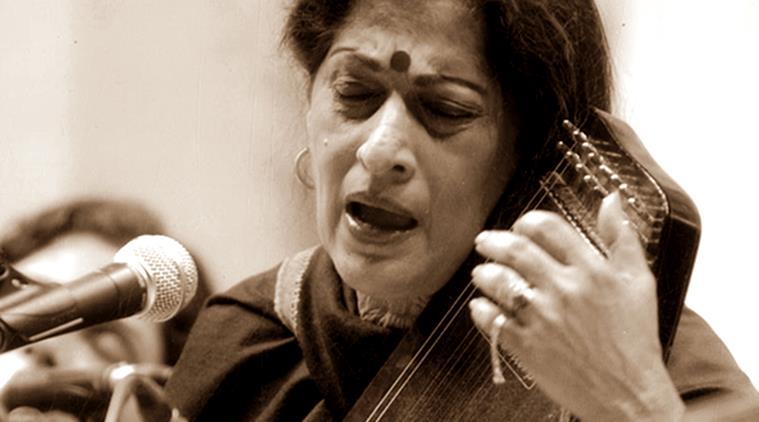Kishori Amonkar was a leading Indian classical vocalist, belonging to the Jaipur gharana, or a community of musicians sharing a distinctive musical style.
She was a performer of the classical genre khyal and the light classical genres thumri and bhajan. Amonkar trained under her mother, classical singer Mogubai Kurdikar also from the Jaipur gharana, but she experimented with a variety of vocal styles in her career.
In the early 1940s, young Kishori began to receive vocal lessons in Hindustani classical music from Anjanibai Malpekar of the Bhendibazaar gharana and later received training from tutors of several other gharanas. Her tutors included Anwar Hussain Khan of Agra gharana, Sharadchandra Arolkar of Gwalior gharana, and Balkrishnabuwa Parwatkar. Amonkar has credited Malpekar, in particular, with teaching her the technique of meend, or gliding, Amonkar’s career as a classical vocalist grew in the 1960s and 70s. Prior to this, she briefly stopped performing because of an illness that affected her ability to sing. Amonkar has said that she used this hiatus in her career to consider and develop her own style of singing, that transcended classical schools (gharanas) of music.
Amonkar has also spoken about the treatment of women performers as classical musicians, noting that the experience of watching her mother perform informed her own approach to professionalism and fair treatment, particularly when it comes to ensuring that musicians are paid well for their performances.
On one notable occasion, she refused to perform because the audience was badly behaved, emphasizing the importance of respecting the performers during a concert.
She created many compositions for a number of ragas. Amonkar was also a popular speaker and traveled throughout India; she was best known for lectures on the role of rasa (feelings or emotions) in music.
LIGHT CLASSICAL AND POPULAR GENRES
In addition to her career as a classical vocalist, Amonkar was known for her performances of lighter classical pieces, with a wide repertoire of thumris and bhajans, as well as some performances for film soundtracks. She sang for the soundtrack of the 1990 Hindi film Drishti. She became interested in film music and sang playback for the 1964 movie Geet Gaya Patharon Ne, but reportedly returned to classical music in part because of unpleasant experiences with the film industry. The decision may have also been motivated by her mother Mogubai Kurdikar’s disapproval; Kurdikar is reported to have told Amonkar that she would be forbidden from accompanying her mother if she continued to work in the film industry.
Amonkar received several of India’s national awards and civilian honours, including the Padma Bhushan, in 1987, and Padma Vibhushan in 2002. She was awarded the Sangeet Natak Akademi Award for 1985 and the Sangeet Natak Akademi Fellowship for 2009. She was awarded the prestigious Dr. T. M. A. Pai Outstanding Konkani Award in 1991. In 2016, she was one of seven recipients of the M.S. Subbulakshmi Award for classical music.
Amonkar was recognised by several of her contemporaries and fellow musicians for her skill and technique in classical music. The tabla musician, Ustad Zakir Hussain, has said that Amonkar’s performances of several ragas, such as Raga Bhoop, are landmark performances that take place over hundreds of years and you will talk about them for the rest of your life and rest of the many centuries to come. The Carnatic vocalist T.M. Krishna praised her approach to classical music, saying, “When Kishoriji sings she is not trying to be new but just by being with her music and continuing to submit to it, she has given classical music an everlasting newness and freshness. This is true creativity.
Amonkar is the subject of a documentary titled Bhinna Shadja, which was directed by Amol Palekar and Sandhya Gokhale. Several of Amonkar’s students have become classical musicians of their own repute, including Nandini Bedekar, Raghunandan Panshikar, Suhasini Mulgaonkar, Mira Panshikar and Meena Joshi. Amonkar’s granddaughter, Tejashree Amonkar, is also a classical musician and was trained by Amonkar.

